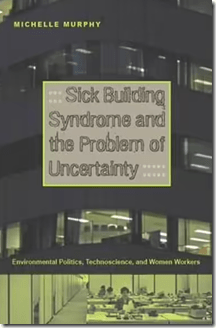Sick Building Syndrome and the Problem of Uncertainty
 This is the title of a very challenging book on the daily harm we experience by the environments we create. You can read a review of the book here
This is the title of a very challenging book on the daily harm we experience by the environments we create. You can read a review of the book here
You can read a report into Sick Building Syndrome (SBS) here:
One of the challenges of tackling this issue is the challenges of gender bias, because the majority of those who suffer from harm in this way are women and, in the past concerns have been dismissed by engineers and a masculinist safety industry that thinks the syndrome is fake because it can’t be measured. And of course, if a feminist raises a concern about safety it is surely easy to dismiss as hysteria (https://timeline.com/sick-building-syndrome-cc82f76a07e9 ). One of the last things Safety wants is a Feminist methodology of Risk! (https://safetyrisk.net/can-there-be-a-feminist-safety/ ) Let’s just pay lip service to women in safety and soldier on.
When it comes to safety engineering, there is none as blind as those who hold a materialist/behaviourist worldview. Of course, the materialist/behaviourist worldview doesn’t believe in things it cannot see and measure, regardless of who and how one is harmed. Zero harm indeed, trapped in blindness to its concocted delusion in empiricism.
Murphy’s book opens up a ‘can of worms’ conversation about harm rarely discussed in the safety industry. If you can’t measure it then you are either delusional or faking your suffering. Amidst all of the evidence for SBS the response from Safety is uncertainty. The best way to attack a threat is not to oppose it but rather to create doubt, in a similar way to how people diffuse the evidence of climate change or vaccinations. Watch Don’t Look Up! (https://www.imdb.com/title/tt11286314/ ) or read this: https://ehjournal.biomedcentral.com/articles/10.1186/s12940-021-00723-0 It can’t be buildings that create harm, it has to be a psychosis, a neat distraction from engineers who nothing of psychosis.
You don’t have to oppose the toxicity of sugar or the harm of coal or the poison of tobacco, you just have to say ‘no-one knows’ or the data is uncertain. When faced with a challenge to a worldview, just go agnostic (https://safetyrisk.net/sia-has-a-bet-each-way-on-zero/ ) and have a bet each way and maintain the delusion, soldier on. When your religion is challenged as a religion, just use religious language to claim you’re not religious (https://www.aihs.org.au/news-and-publications/news/what-do-when-vision-zero-new-global-line ). Just hang out zero as a ‘global by-line’ and maintain the crusade at each Hillsong Global safety Conference. And for god sake, make sure zero gets no mention in a Body of Knowledge.
This is what happens with SBS. When your methodology is anchored to the fortress of engineering what notion of critical thinking can be applied to propaganda? (https://monoskop.org/images/4/44/Ellul_Jacques_Propaganda_The_Formation_of_Mens_Attitudes.pdf )
I have written before about the harm of ‘hot desking’ (https://safetyrisk.net/selective-safety-and-well-being/ ) and about safety in space and place (https://safetyrisk.net/the-safety-of-space-and-place/ ). Poor old safety/zero so busy counting injury rates it can’t see the forest for the trees.
When you say you take harm seriously and then ignore SBS, you obviously don’t take harm seriously. This is the beauty of selective harm (https://safetyrisk.net/selective-safety-and-well-being/ ) so common in the absolute world of zero, that rejects absolutes. When Zero calls out ‘zero accidents and disease’ it doesn’t really mean it.
The data shows that 89% of the practitioners in the industry don’t believe in zero! (https://safetyrisk.net/take-the-zero-survey/ ) The only thing that killed off the toxicity of ‘hot desking’ was Covid not Safety.
So, as governments and organisations now call for people to return to the office, what an opportune time to audit your workplace for SBS (https://www.ncbi.nlm.nih.gov/pmc/articles/PMC7153445/ ).